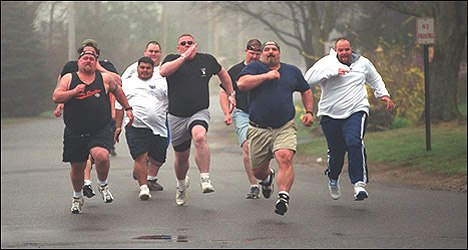Running can help you lose weight, but not in the way might think. Follow these tips to run your way to weight loss.
- Running is one of the best workouts for weight loss thanks to its accessibility.
- Paying attention to your diet, incorporating strength training into your routine, and getting enough sleep are also important factors for losing weight.
- Timing matters too, as some research suggests that running in the morning is optimal for weight loss.
Does swimming burn calories? Yes. How about cycling? Yes. How about a fancy fitness retreat in the south of France? Oui.
All of those things are great for weight loss, but they have a higher barrier to entry compared to running. You need a pool, a bike, and a six-figure salary, respectively. But if you can afford a pair of sneakers (like these running shoes for less than $100) then you can run. You can run in hot weather. You can run in cold weather. You can run in the snow. You can run in the rain. You can run with a friend. You can run by yourself. You can even run every single day if you’re smart about recovery.
It’s that kind of accessibility that makes running one of the best workouts for weight loss. “You just need a pair of decent shoes, some creativity, and maybe a friend or two to develop a walking or running plan,” says Daniel O’Connor, Ph. D., professor of health and human performance at the University of Houston. “It’s less expensive than joining a gym or having a personal trainer.”
That’s a big deal considering time and opportunity are some of the biggest hurdles people face when trying to make fitness a priority. “Everyone is dealing with full schedules and competing priorities, so it’s often difficult to add something new to your routine without trading something else out,” O’Connor says. You’ll still need to shift some things around to make running a serious part of your life, but being able to run right out your front door, free of charge, eliminates some very real roadblocks. (For proof, see: 20 Incredible Stories of Weight Loss Through Running)
Still, running for weight loss is a little more complicated than hitting the pavement and hoping the pounds melt away. There’s a strategy involved, and we can help. Here’s everything you should know about running for weight loss.

What should runners eat to lose weight?
There are a billion benefits of running—including weight loss—but running isn’t a reason to ignore your diet, especially if you’re trying to lose weight. In fact, you could find yourself gaining weight if you over fuel your runs.
“Most people overestimate the calories they burn on a run,” says Angela Rubin, USAT Level I triathlon coach and studio manager of Precision Running Lab at Equinox in Boston. As a very general estimation, you burn about 100 calories per mile (use this calculator to determine how many calories you burn based on your weight). So if you run two or three miles, you’ll burn about 200 to 300 calories—a solid workout.
Problem is, lots of people add a 400 calorie brownie or extra slice of pizza to their diet because they “earned it.” While we’re all for treating yourself, the reality is that you need to create an overall calorie deficit if you want to lose weight.
“Weight loss is about creating a caloric imbalance, where you’re using slightly more calories than you’re consuming, say 200 calories per day,” O’Connor says. So while it’s totally normal to crave something sweet or carb-heavy after a run, you need to keep your indulgences in check if weight loss is your ultimate goal.
How many days a week should you run to lose weight?
Yes, athletes are constantly optimizing their training plans and race-day strategies, but you don’t need to go crazy if you’re just starting out. “When it comes to weight loss, moving and burning calories are what matters,” O’Connor says. “If you like sprints, which have a higher rate of calories burned per minute, then have at it; but if you prefer walking or slower jogging, you’ll just need to spend more time to burn those calories.”
That said, a Medicine & Science in Sports & Exercise study found that runners lost more weight than walkers over a six-year period, possibly because of the afterburn effect. “Running at a high intensity will create an afterburn, which is when your body continues to burn calories when you’re no longer moving,” Rubin says. She suggests starting with three 30-minute runs a week, sprinting for 30 seconds then recovering for 30 seconds to a minute.
How do you lose weight with strength training?
Cross-training is important for a few reasons: First off, it makes you a stronger runner and reduces your risk of injury. “Running is only hard on your joints if you don’t have the muscle to support them,” Rubin says. Secondly, lifting will help you lose weight. “The more lean muscle mass you have, the more calories you’ll burn at rest,” she says. That’s right, more muscle means more burned calories when you’re just sitting around. To get started, try these 10 essential strength exercises for runners.
How do you get the runner’s high?
The runner’s high is real: a Journal of Experimental Biology study shows that running releases endocannabinoids, which are associated with pleasure and could keep you coming back for more. But don’t worry if the idea of a runner’s high feels more distant than a marathon finish-line. You just need to move past the point in which running totally sucks.
“Your body is made to run, but you won’t have the conditioning if you never do it,” Rubin says. “Work your way up by running regularly (see: the three times a week we mentioned above), and it should start to feel more natural over a month.” Before you know it, weight loss may even become an afterthought, too.
Is it better to exercise in the morning?
While rolling out of bed earlier than usual isn’t always appealing, running first thing in the morning is a great habit to form for a few reasons. First, it guarantees you won’t skip out on your mileage later when work runs late, or you have an unexpected obligation. Plus, the morning miles might make you more productive and communicative with your colleagues and friends, as studies have found that running can sharpen your focus and critical thinking skills.
Also, according to recent research, people who exercise in the morning are more successful at losing weight than those who worked out at night. In the study, researchers divided 48 women into two groups—one that did aerobic exercise in the morning for six weeks, and another who worked out in the evening—and asked them to record what they ate during the period. The results found that the early bird exercisers consumed less calories throughout the day and ultimately lost more weight than the night owls.
Other studies have found that exercising in a fasted state—i.e., running before you eat breakfast in the morning—burns more fat than running after eating. If you are heading out on an empty stomach, though, aim for a shorter and easier route, so you’ll avoid bonking midway through. (Read: Don’t go on a long or high-intensity run under-fueled!)
Why is it important to get enough sleep?
While maintaining good habits during the day—eating well, exercising regularly—are crucial for weight loss, resting at night is just as important for keeping off the pounds. In a study published by Plos One journal last year, researchers found that people who skimped on sleep were more likely to have higher body mass indexes and larger waist circumferences than those who got adequate shut-eye.

The good news is, running may help you fall asleep easier and more deeply. Numerous studies have found that daily aerobic exercise—specifically the moderate to intense type, like cardio, strength training, and yoga—improves our sleep quality, which helps us avoid the consequences of sleep deprivation such as increased risk of cardiovascular disease and metabolism issues. If you run in the evening, make sure to leave enough time before bed to let your body temperature and heart rate lower, so you don’t feel too revved up to fall asleep.
A true love for sports



Recent Comments